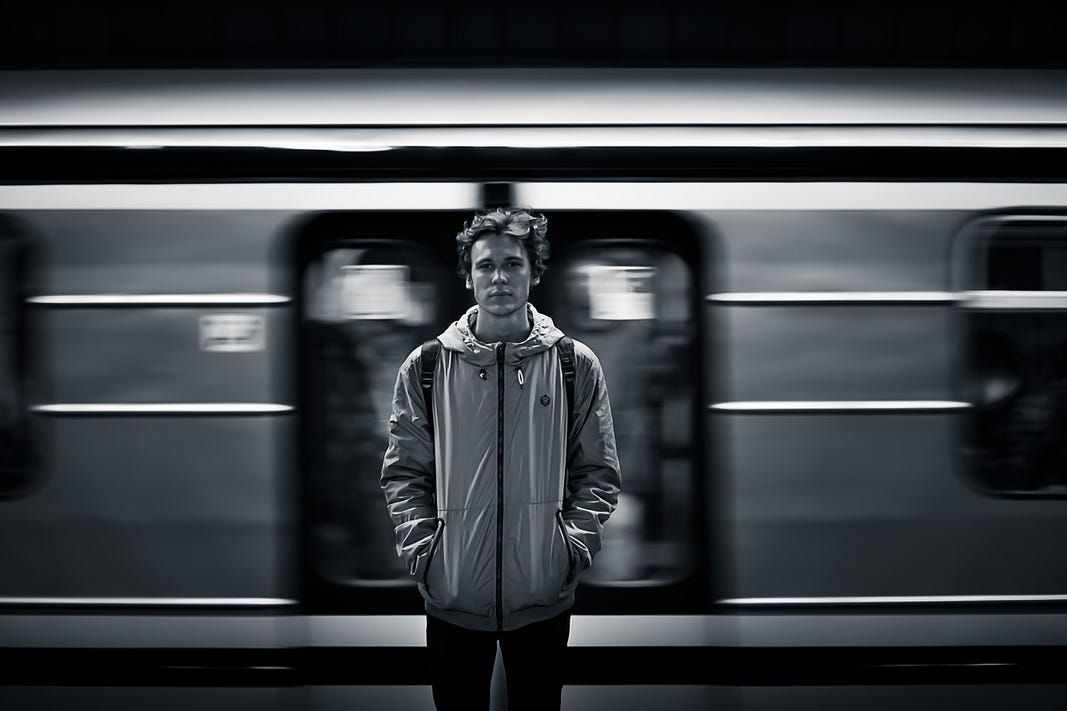
MERRY FREAKIN’ CHRISTMAS, that’s craaaaaaaazy lookin’! Photo by Mikael Kristenson on Unsplash
One day long ago, a horse I was fond of came to me and bit my arm, breaking the skin.
As blood seeped from the wound I asked, “Why did you bite me.”
The stallion shook its proud head, stamped its powerful hooves, and whinnied, “Because I can, small human.”

The clattering melody the train wheels sang under my feet was hypnotic. It beat a staccato rhythm against the rails, countering the smooth, blur outside the double-pane window upon which I rested my right temple. The car swayed; gently, then roughly, and gently again. Several tons of steel, aluminum, plastic, wood, and fabric played a cacophonous symphony as it hurtled down the misty California coastline. I watched without seeing, my vision blurred as my mind juggled thoughts of indecision and mortality.
“Is anyone sitting here,” said a voice over my left shoulder. I sat alone in a set of four seats arranged to face each other.
“No,” I responded, leaving my head on the chilly glass.
“Indeed,” said the voice.
Santa Barbara was fading away behind me, but the little city couldn’t have remained clearer in the theater of my mind. The events of the last week were still fresh, an open wound of shock, resignation, and pent up emotion let loose in a resultant torrent of rage.
I got the news Tuesday morning as I drove to work through Santa Ana. The traffic was worse than usual, an accident a few miles away having caused ripples of congestion to spread out like concentric wavelets on the surface of a pond.
My father had been found dead in his Ojai home.
The scuttlebutt was homicide, as if that were even possible. The idea was so absurd I couldn’t stop turning it over and over, examining every possible angle. I called work and told them I wasn’t coming in, that there was a sickness in the family, and I would be gone for, at least, a few days. My boss wished me and my family well, and I turned around to head North. You can, after all, go home again, but nothing will be the same.
I guess that was the point.
The trip up the coast was punctuated by whipping rain and tearing gusts pouring from dull, grey skies, feeling very much like my mood had been extracted and hoisted up for all to see. I rented a car in Santa Barbara and drove up to Ojai, checked in at a hotel, and made my way to the house. My father’s body had already been moved, and there was some kid in a police uniform minding the front door, trying to look authoritative.
That… familiar voice came out of the fog.
“A penny for your thoughts,” it said.
“That’s my line,” I quipped, and looked around.
That was the first time that turning my head would be an event unto itself. I stared across the gap between the seats to peer into eyes as pale blue as my own, but older, worn, beaten, but oddly content. The elderly man smiled at me; his left front incisor cocked at an odd angle. He stroked his sparse, closely cropped beard and chuckled.
“Pay no mind to me. I just saw you so deep in thought you might want some help back up for some air,” he said in a comfortable baritone.
“Oh, it’s nothing,” I lied. “I’m just thinking about something.”
“Yeah.” He said. I sighed and turned to look at the endless shoreline passing by.
“Rough times,” he said, almost too quietly to hear.
I had just gotten out of the rental when an unmarked detective car rolled up to the curb. The doors popped open and two large men in neatly tidy suits climbed out, making the Crown Victoria look like a clown car. The passenger took two enormous, though oddly lazy, strides towards me and extended his hand.
“Mr. Kerr.” It was a statement of fact.
“Yes,” I replied.
“I am sorry for your loss.” Another statement of fact.
“Thank you,” I responded. I shook his hand or, to be accurate, he enveloped mine and then waggled it around.
“Mr. Kerr,” stated the other man, “I’m Detective Hatch. This is Detective Stokes.” Hatch put his hand in his pocket and pulled out what looked like a Zippo lighter. It was his smart phone. A smirk crossed my face.
“Your father was found at 5AM Tuesday morning. I was the one who called you. I can’t give you any details about the crime, but I can tell you that it was clear that he was killed,” announced Hatch. Stokes nodded in agreement, clutching his hands behind his back at what appeared to be parade rest.
It didn’t really click into place. They were just words, spoken at me by a pair of monotonic yetis in dark suits. My mother had passed away four years prior of lung cancer. She was a prodigious smoker. My father had never smoked. He had been retired for more than a decade but had never stopped being a minister to his congregation.
“Wow,” was all I could say.
The train started to slow, its rhythm slowing in pace and insistence. We were stopping at Union Station in downtown LA where I would change over to a Metro train to take me back to Mission Viejo. The marine layer was thick, but it wasn’t raining. The man sitting across from me was looking across the car. I could see he was a little thinning, his hair a rumpled mess of brown and grey.
“What did you mean,” I asked his neck. He slowly turned, that gentle, crooked smile on his lips.
“By what,” he queried.
“You said ‘rough times’ just now,” I reminded him.
“Oh, that.”
“Yeah.”
“You had this look in your eyes that spoke of a deep pain,” he said, his gaze calm and friendly. He smiled a little less.
“If only that weren’t true,” I said. I felt the anguish start to bubble in my gut and a flush come to my face.
“I’ve seen some ugly things,” he said.
I sat there, saying nothing. The train was moving into the yard. In a few minutes, everyone would be getting up to get off the train and find their happiness or sadness or nothing at all.
“There was once a time in my life that I had no idea what to do. I had faced a terrible demon and fought it for years,” he said, almost wistfully.
“What happened,” I asked.
“I won.” The smile came back. I looked into those eyes and I saw that there was peace.
The train came to a stop and dozens of people stood, fetching parcels and luggage from the overhead racks. I started to stand, but the man placed his hand on mine and leaned in.
“I know you’ll win, too,” he said, winking.
He stood, wheeled around, and followed the crowd out of the train car. After a few minutes, I stood up, wondering what just happened. I grabbed my bag, and swung down out of the train, sucking at the the little notch in my front tooth.
Photo by Stefan Stefancik from Pexels
I'm just going to write something directly out of my head, so we'll see how it goes. -TCR
I've always liked the name Larry. It feels old without being stuffy, and there's an inherent jocularity about it. When you hear that you'll be meeting with some dude named Larry it instills in you the idea that the interaction won't be dark or heavy. When I walked into the room to meet my particular Larry, however, things didn't go as expected.
My Larry was a woman and anything but jovial.
"Sit," she said, not looking up from her tablet. I sat.